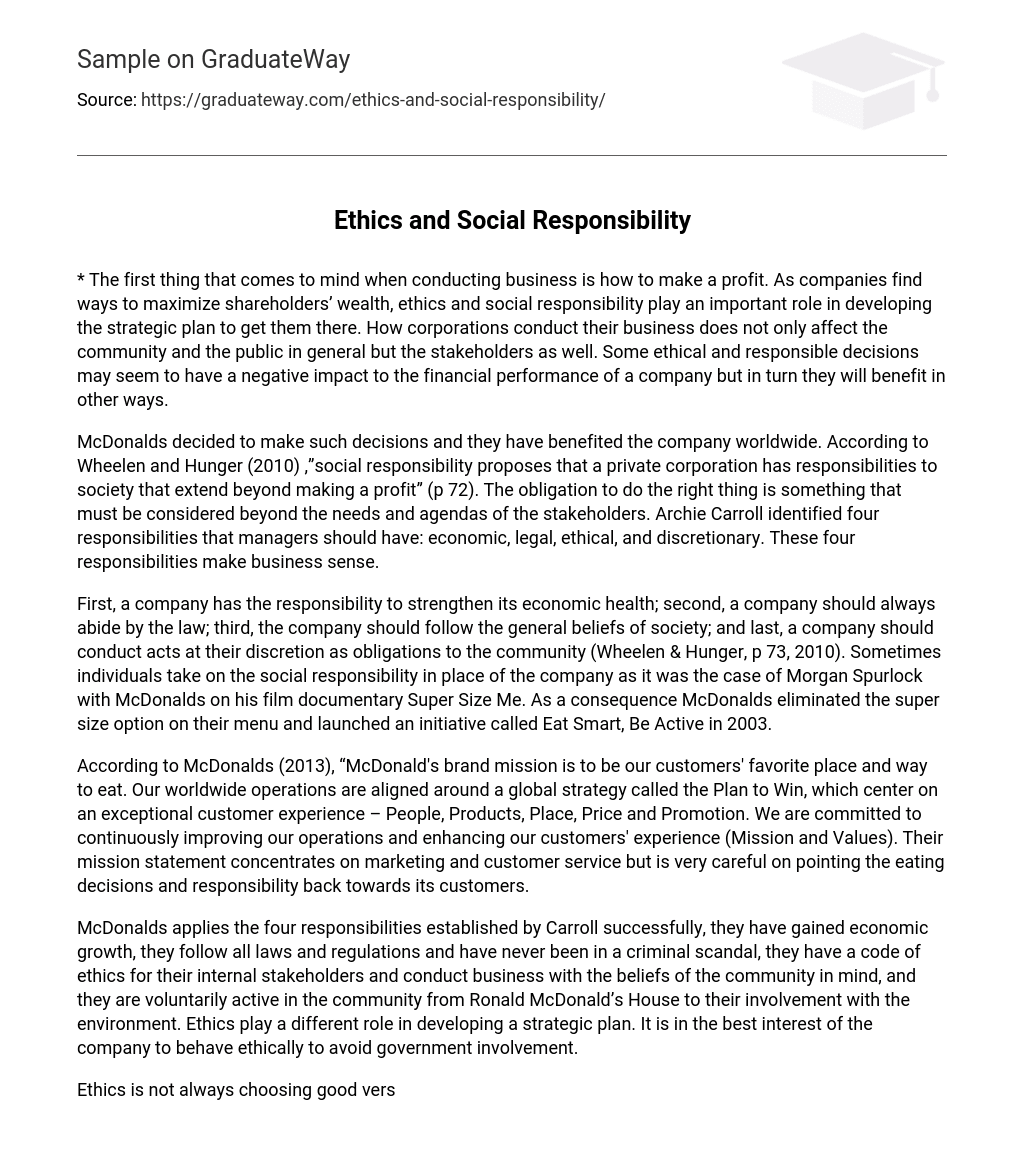The first thing that comes to mind when conducting business is how to make a profit. As companies find ways to maximize shareholders’ wealth, ethics and social responsibility play an important role in developing the strategic plan to get them there. How corporations conduct their business does not only affect the community and the public in general but the stakeholders as well. Some ethical and responsible decisions may seem to have a negative impact to the financial performance of a company but in turn they will benefit in other ways.
McDonalds decided to make such decisions and they have benefited the company worldwide. According to Wheelen and Hunger (2010) ,”social responsibility proposes that a private corporation has responsibilities to society that extend beyond making a profit” (p 72). The obligation to do the right thing is something that must be considered beyond the needs and agendas of the stakeholders. Archie Carroll identified four responsibilities that managers should have: economic, legal, ethical, and discretionary. These four responsibilities make business sense.
First, a company has the responsibility to strengthen its economic health; second, a company should always abide by the law; third, the company should follow the general beliefs of society; and last, a company should conduct acts at their discretion as obligations to the community (Wheelen & Hunger, p 73, 2010). Sometimes individuals take on the social responsibility in place of the company as it was the case of Morgan Spurlock with McDonalds on his film documentary Super Size Me. As a consequence McDonalds eliminated the super size option on their menu and launched an initiative called Eat Smart, Be Active in 2003.
According to McDonalds (2013), “McDonald’s brand mission is to be our customers’ favorite place and way to eat. Our worldwide operations are aligned around a global strategy called the Plan to Win, which center on an exceptional customer experience – People, Products, Place, Price and Promotion. We are committed to continuously improving our operations and enhancing our customers’ experience (Mission and Values). Their mission statement concentrates on marketing and customer service but is very careful on pointing the eating decisions and responsibility back towards its customers.
McDonalds applies the four responsibilities established by Carroll successfully, they have gained economic growth, they follow all laws and regulations and have never been in a criminal scandal, they have a code of ethics for their internal stakeholders and conduct business with the beliefs of the community in mind, and they are voluntarily active in the community from Ronald McDonald’s House to their involvement with the environment. Ethics play a different role in developing a strategic plan. It is in the best interest of the company to behave ethically to avoid government involvement.
Ethics is not always choosing good versus bad. Sometimes good business decisions can be unethical and is important to make the right decision moving forward. What may be unethical from one person may be ethical for another, especially for companies that operate globally. To address this ambiguity among societies, companies have established ways to encourage ethical behavior. According to Wheelen and Hunger (2010), “One way to do that is by developing codes of ethics. Another is by providing guidelines for ethical behavior” (p 83).
At McDonalds the board of directors has a code of conduct, the financial officer has a code of ethics, the suppliers have a code of conduct, and there is a standard of business conduct for its employees (McDonald’s, 2013). McDonalds have overstepped ethical boundaries with their unhealthy menus. McDonalds is the largest fast food advertiser in the world targeting small children and yet their menus are high on calories, carbohydrates, and cholesterol. For years it has been a public argument whether McDonalds is or is not responsible for the health of their customers.
They have been scrutinized by the media and the public in general and as a result, they have made some changes to the alternatives the customers have to their dining experience. According to McDonalds (2013), “We operate our business ethically. Sound ethics is good business. At McDonald’s, we hold ourselves and conduct our business to high standards of fairness, honesty, and integrity. We are individually accountable and collectively responsible (Mission and Values). This is part of their values but is hard to quantify when they fail to define fairness, honesty, and integrity.
One way that McDonalds can avoid this type of situation in the future is by conducting a stakeholder analysis. This process will identify the primary and secondary stakeholders and the effects the strategic decisions will have on those stakeholders (Wheelen & Hunger, pp. 76, 2010). Conclusion A company’s strategic committee must take in consideration social responsibility and ethics during the planning stage. Some decisions, although profitable, are sometimes unethical and irresponsible.
There are multiple reasons companies decide to behave ethically or unethically but they all affect the stakeholders. During the strategic planning phase companies must conduct stakeholder analysis and evaluate the effects their strategy will have on them. Companies should also address Carroll’s four responsibilities. McDonald’s have done a good job at covering these responsibilities in their strategy and at offering value to their stakeholders. This is why, even though they continue to create controversy with their menus, McDonald’s is the largest, most successful fast food company in the world.
References
- McDonald’s. (2013). McDonald’s.com. Retrieved from http://www.aboutmcdonalds.com/mcd/our_company/mission_and_values.html
- Wheelen, T.L., & Hunger, J.D. (2010). Concepts in strategic management and buisness policy (12th ed.). Retrieved from The University of Phoenix eBook.





